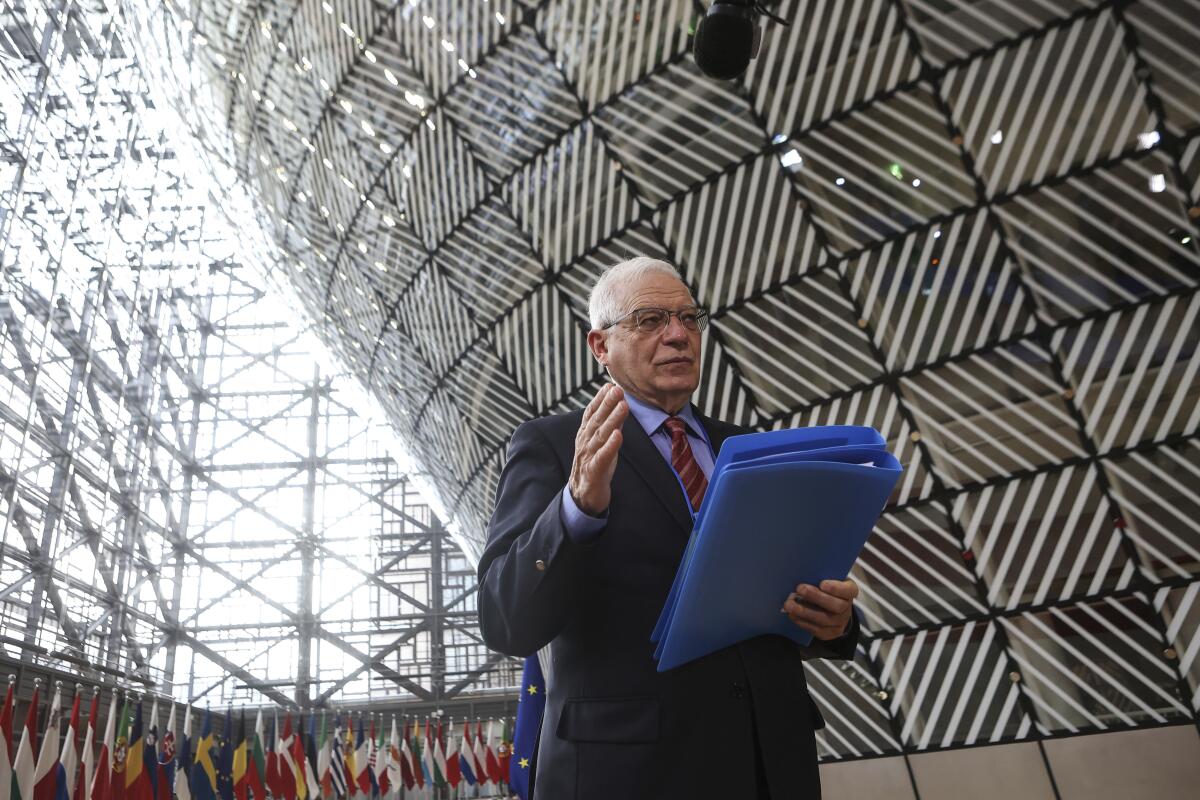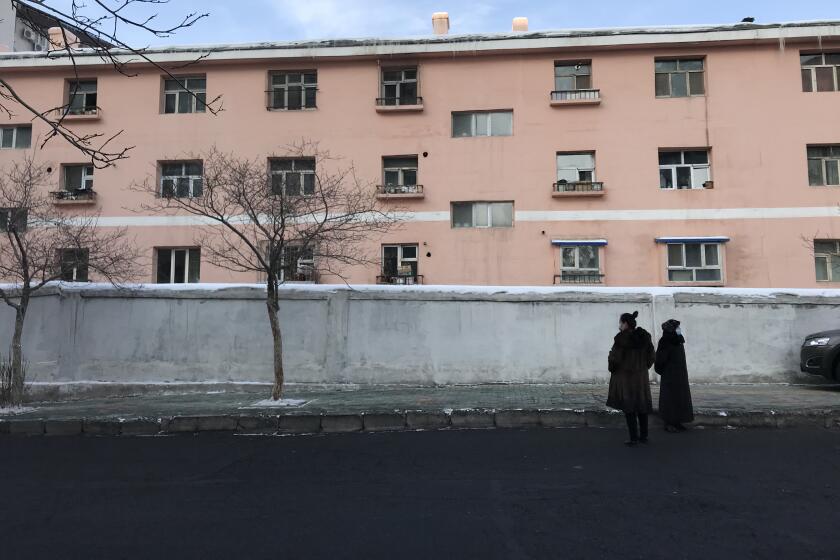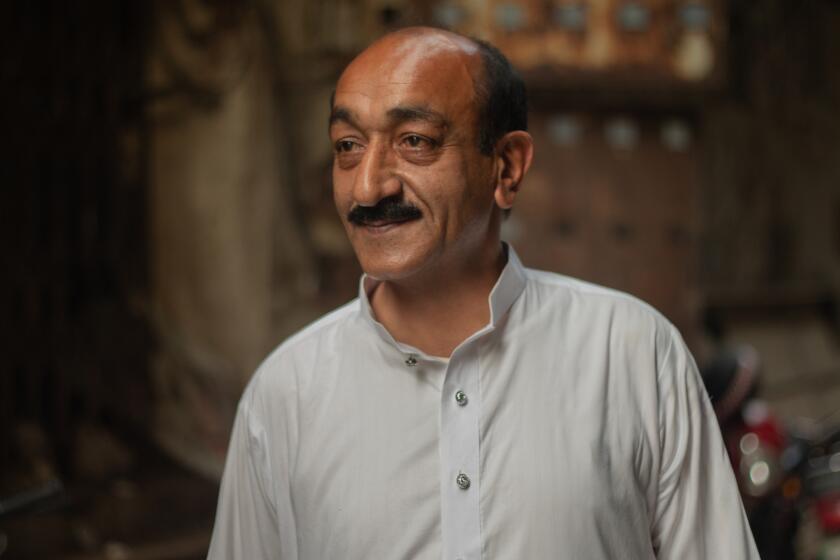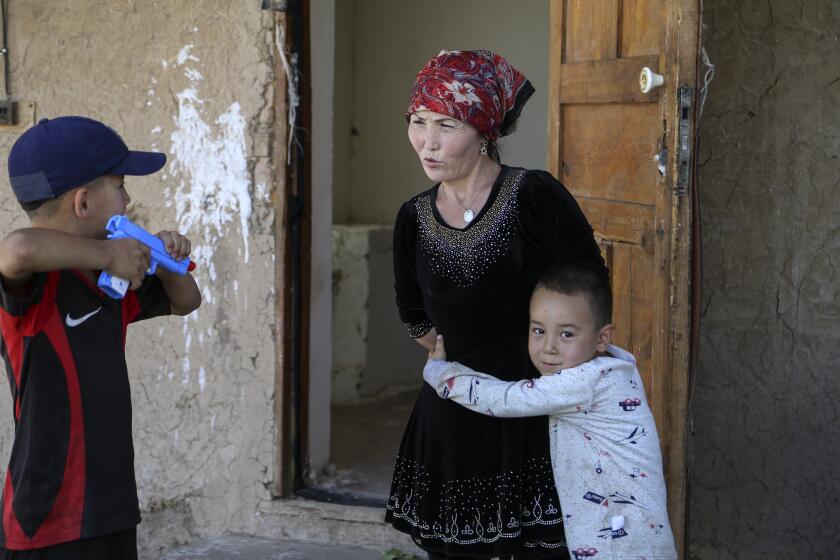EU, U.S., U.K., Canada coordinate sanctions on Chinese officials over Uyghur abuses

- Share via
BRUSSELS — The European Union, Britain, Canada and the United States on Monday launched coordinated sanctions against officials in China over human rights abuses in the far western Xinjiang region, provoking swift retaliation from Beijing.
The EU targeted four senior officials in Xinjiang. The sanctions involve a freeze on the officials’ assets and a ban on them traveling in the bloc. European citizens and companies are not permitted to provide them with financial assistance.
The 27-nation bloc also froze the assets of the Xinjiang Production and Construction Corps Public Security Bureau, which it describes as a “state-owned economic and paramilitary organization” that runs Xinjiang and controls its economy.
British Foreign Secretary Dominic Raab said the measures were part of “intensive diplomacy” by the U.K., the United States, Canada and the 27-nation EU to force action amid mounting evidence about serious rights abuses against the Uyghur Muslim people.
U.S. Secretary of State Antony Blinken said in a statement that “a united transatlantic response sends a strong signal to those who violate or abuse international human rights, and we will take further actions in coordination with likeminded partners.”
“We will continue to stand with our allies around the world in calling for an immediate end to the PRC’s crimes and for justice for the many victims,” Blinken said.
China responded immediately to the EU’s move, slapping sanctions on 10 European individuals and four institutions that it said had damaged China’s interests and “maliciously spread lies and disinformation.”
Initially, China denied the existence of camps for detaining Uyghurs in Xinjiang but has since described them as centers to provide job training and to reeducate those exposed to radical jihadi thinking. Officials deny all allegations of human rights abuses there.
A vast system of Chinese surveillance, detention, cultural erasure and forced labor has devastated the Uighur people in Xinjiang, their homeland.
Xinjiang had been a hotbed of antigovernment violence, but Beijing claims its massive security crackdown has brought peace in recent years.
China’s Foreign Ministry denounced the EU sanctions as “based on nothing but lies and disinformation” as it issued its own retaliatory measures.
The ministry announced sanctions against 10 individuals and four institutions, saying that they and their family members would be barred from entering mainland China, Hong Kong or Macao and cut off from financial dealings with those areas.
Among those targeted was Adrian Zenz, a U.S.-based German scholar who has publicized abuses against minority groups in Tibet and Xinjiang. China has said companies and individuals have petitioned to sue Zenz, but it wasn’t clear who the plaintiffs were or how they would pursue legal action across borders.
China’s oppression of Muslims reaches beyond Xinjiang into Pakistan. Why does it stay quiet?
Others targeted for sanctions included five members of the European Parliament: Reinhard Butikofer, Michael Gahler, Raphael Glucksmann, Ilhan Kyuchyuk and Miriam Lexmann.
The ministry did not say what measures would be taken against the organizations. They were listed as the Political and Security Committee of the Council of the European Union, where the 27 national envoys decide foreign and security policy; the EU Parliament’s Subcommittee on Human Rights; the German-based Mercator Institute for China Studies; and the Alliance of Democracies Foundation in Denmark.
Amazon faces questions from senators over a reported contract with Dahua, a Chinese security camera company that touted on its website the ability to alert police when its facial recognition software identifies members of the Uighur ethnic group.
EU foreign policy chief Josep Borrell, who chaired the meeting of foreign ministers, expressed dismay at China’s reaction and said the EU’s sanctions respect the “highest standards of rule of law.”
“Rather than change its policies and address our legitimate concerns, China has again turned a blind eye, and these measures are regrettable and unacceptable,” Borrell said.
“There will be no change in European Union determination to defend human rights and to respond to serious violations and abuses,” he added, and described the coordination between the EU, Britain, Canada and the U.S. as “perfect.”
A state-orchestrated campaign is reducing births among the minority Uighurs of China’s far west Xinjiang region with brutal efficiency.
The new EU sanction system is similar to the United States’ Magnitsky Act — Obama-era legislation that authorizes the U.S. government to sanction those it sees as human rights offenders, freeze their assets and ban them from entering the United States.
As part of Monday’s move, the EU also imposed sanctions over repression in North Korea, “extrajudicial killings and enforced disappearances in Libya, torture and repression against LGBTI people and political opponents in Chechnya in Russia, and torture, extrajudicial, summary or arbitrary executions and killings in South Sudan and Eritrea,” a statement said.
Those targeted in Libya were Mohammed Khalifa al-Kani, leader of Libya’s notorious al-Kaniyat militia, and his brother Abderrahim al-Kani, a member of the same militia. Both are accused of committing extrajudicial killings and enforced disappearances between 2015 and June 2020 in the town of Tarhuna, which they had controlled for years.
Since their escape from Tarhuna last summer following a military defeat, dozens of mass graves have been discovered and attributed to al-Kaniyat militiamen. Last year, the U.S. Treasury targeted al-Kaniyat and its leader over the same alleged crimes.
More to Read
Sign up for Essential California
The most important California stories and recommendations in your inbox every morning.
You may occasionally receive promotional content from the Los Angeles Times.














